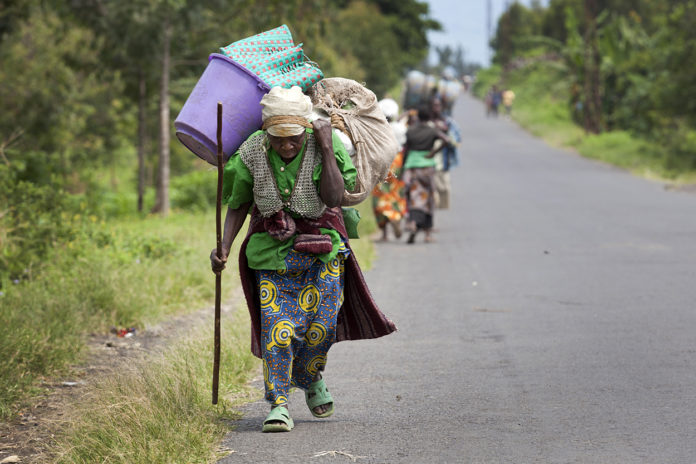Donors have announced $528 million in funding to support the delivery of humanitarian aid to the Democratic Republic of Congo (DRC), where at least 13 million people, a third of them internally displaced, need emergency humanitarian assistance this year. The announcements were made at a humanitarian conference in Geneva, co-chaired by the United Nations, the European Union and the Kingdom of the Netherlands.
"The Democratic Republic of Congo is facing one of theworld' s biggest humanitarian crises" António Guterres, UN Secretary-General
The amount announced in Geneva by the donors represents a quarter of the 2.2 billion dollars originally requested by the UN to respond to the humanitarian crisis in the DRC: 1.7 billion dollars to finance the Humanitarian Response Plan inside the DRC and over 504 million dollars to support the 807,000 Congolese refugees in neighboring countries and meet the needs of over 540,000 refugees from other countries currently on Congolese territory.
Speaking at the conference at the Palais des Nations, the head of the United Nations Office for the Coordination of Humanitarian Affairs (OCHA), Mark Lowcock, said, "It's a lot of money. But it represents less than 50 cents a day for each of the people whose lives we are trying to save and protect."
In the DRC, "humanitarian needs are increasing", warned Mark Lowcock, pointing out that the current crisis has its roots in ethnic, political and economic conflicts. According to the head of OCHA, ethnic violence has worsened in the east of the DRC, while some parts of the country spared by armed conflict and disasters have seen high levels of violence over the past year.
"The political transition is creating tensions," added the UN humanitarian chief, while pointing out that external shocks have weakened the Congolese economy, "with a dizzying drop in commodity prices affecting the currency and fuelling an inflationary spiral and pressures on public spending, which are all causing hardship for populations across the country."
In the space of a year, the number of people in need of assistance in the DRC has almost doubled, from 7.3 million to 13.1 million. Some 7.7 million people suffer from food insecurity. In total, severe acute malnutrition threatens the lives of 2.2 million children, and over 4.6 million children suffer from acute malnutrition. The head of OCHA recalled that in the Kasai region, thousands of farmers have missed three successive agricultural seasons, leading to a drop in agricultural production.
"As I speak, the resurgence of inter-ethnic conflict in Ituri in February is killing many people and increasingly leading to internal and cross-border displacement," remarked Mark Lowcock, adding that the DRC is also facing epidemics, including the worst cholera crisis in 15 years. "Sadly, there is also an epidemic of sexual violence, much of it unreported and untreated, and much of it against children," he said.
"It's insecurity that needs to be dealt with so that people can go home".
On his return from a visit to the DRC, the United Nations High Commissioner for Refugees, Filippo Grandi, emphasized the interdependence of the crises that have plagued the Great Lakes region for over a quarter of a century. This was the UNHCR chief's way of underlining the need for a renewed determination to find lasting solutions. "We're going to be talking a lot about humanitarianism. That's fine, it's urgent and it's necessary, but it's all linked to the resolution of political conflicts", remarked Mr. Grandi.
For the High Commissioner, we need to work harder and better to find solutions to these displacement situations, particularly for refugees and internally displaced people. *This is an issue I raised during my meetings last week with the Heads of State of the DRC, Rwanda and Burundi", said Filipo Grandi. "To Presidents Kabila, Nkurunziza and Kagame, I told them what all the refugees and displaced people are unanimously telling me: that insecurity must be resolved so that people can return home." The other axis explored by the UN agency is to increase the resources allocated to reintegrating people into their communities when they decide to return home. "And thirdly, the States of the region need to work more and better together to find a solution to these phenomena", stressed the head of UNHCR.
Despite the deteriorating humanitarian situation, the UN nevertheless recognizes that progress is possible in the DRC. Over the past 15 years, under government leadership, infrastructure in many of the country's major cities has improved, access to education has been enhanced, infant mortality rates have fallen and vaccination rates have risen.
"The government of the Democratic Republic of the Congo is providing leadership on this crisis," stressed Mark Lowcock, who also welcomed Kinshasa's commitment to provide nearly $100 million from its own resources. Over the next two years, these funds will facilitate the reintegration of Congolese refugees, returnees and internally displaced persons. "We will continue to work closely with the government. We are discussing with them the follow-up to today's conference, and this discussion will take place at a time and place convenient to the government," concluded the UN humanitarian chief.


